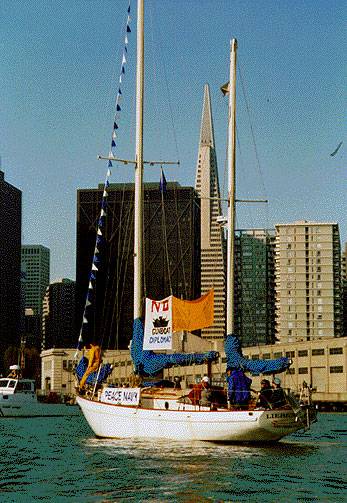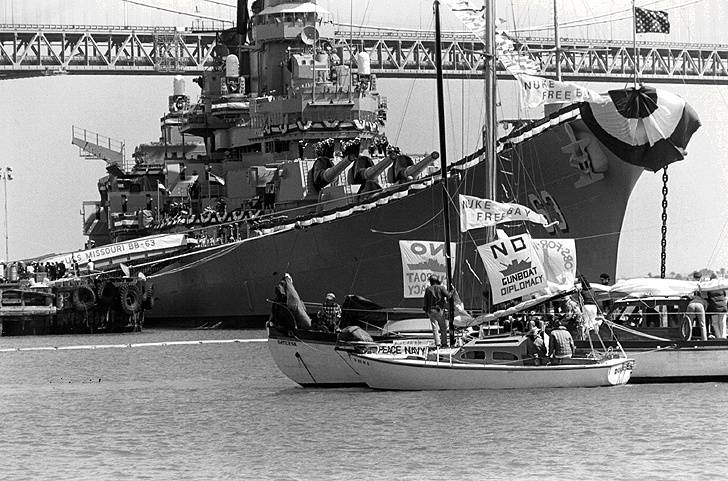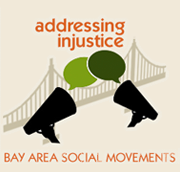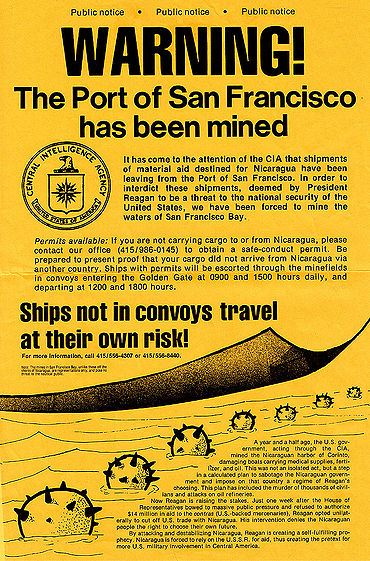Bay Area Peace Navy: Difference between revisions
(Addressing Injustice logo added) |
(linked to Bay Area Social Movements category) |
||
| Line 69: | Line 69: | ||
[[Symbionese Liberation Army|Prev. Document]] [[S.O.S & Stop Our Ship|Next Document]] | [[Symbionese Liberation Army|Prev. Document]] [[S.O.S & Stop Our Ship|Next Document]] | ||
[[category:Dissent]] [[category:1980s]] [[category:1990s]] [[category:Military]] [[category:anti-war]] | [[category:Dissent]] [[category:1980s]] [[category:1990s]] [[category:Military]] [[category:anti-war]] [[category:Bay Area Social Movements]] | ||
Revision as of 14:41, 6 August 2014
"I was there..."
--Bob Heifetz, 1998, co-founder of the Peace Navy
Photo: Bob Heifetz, Peace Navy
<iframe src="https://archive.org/embed/ssfFLTWK93" width="640" height="480" frameborder="0" webkitallowfullscreen="true" mozallowfullscreen="true" allowfullscreen></iframe>
Peace Navy obstructs USS Missouri during contentious campaign to homeport the Missouri in San Francisco during the 1980s.
Photo: Bob Heifetz, Peace Navy
<iframe src="https://archive.org/embed/SaulBloomOnNukesTheUssMissouri" width="640" height="480" frameborder="0" webkitallowfullscreen="true" mozallowfullscreen="true" allowfullscreen></iframe>
Saul Bloom describes his own history with Greenpeace and opposing the homeporting of the USS Missouri in San Francisco during the 1980s.
Video: Chris Carlsson and David Martinez, from the Ecology Emerges project.
The Bay Area Peace Navy was launched in 1983 by a group from the American Friends Service Committee committed to ending arms shipments from the Bay Area's Port Chicago to Central America. Since then, we have engaged in a rich variety of water-based guerrilla theatre dramatizing our opposition to U.S. Naval intervention abroad and support for ecologically sound, socially just and peaceful uses of the Bay at home. Our events use humor and satire to express our views depicted by the beauty of small and larger boats festooned with banners and sails carrying our message to targeted audiences. We see ourselves as a cross between the theatrics of the Mime troupe and the direct action dramatizations of Greenpeace. We work with peace, ecology, labor and social justice groups.
We have had a fleet of over 100 privately owned boats ranging from kayaks and windsurfers to day sailors and blue water yachts, sailing under the motto, "Join the Peace Navy and Save the World". Our members are as diverse as the boats in our fleet: boilermaker and carpenters, doctors and lawyers, students and pensioners, artists and filmmakers. Our youngest member was 7, our oldest, 85. To be a member of the Peace Navy means that you like at least some of the causes we support and some of the ways in which we express that support. It means that, time permitting, you would be ready to make yourself and any floating platform you can command (with the assistance of others if desired), available for an action. Our only meetings are those few devoted to developing a consensus around a proposed action and organizing to pull it off. Plus a few parties to celebrate our victories.
We have opposed the transport of nuclear armed and powered ships in our densely populated region, supported efforts to reduce the military budget in favor of transferring those funds to desperately needed peacetime uses in such areas as housing, health, education, recreation, and culture. Two of our boats took medical supplies to Nicaragua after a devastating hurricane, symbolizing our opposition to U.S. efforts to overthrow the former Sandinista Government Two of our members were part of a Witness for Peace delegation seeking to promote peace in south of that country. They were captured on the Rio San Juan by contra forces trained and supported by the U.S. Government. Annually, we have organized a counter-flotilla to the U.S. Navy's Fleet Week propaganda extravaganza. We countered efforts by the Navy to limit our presence at that event as part of their so-called "anti-terrorist" concerns. The ACLU took our case: "The United States of America, et al vs. the Bay Area Peace Navy." We won.
We have worked with waterfront unions around labor rights issues, with the Haitian Community to dramatize their struggle for democracy and rights of political asylum, with Greenpeace for a nuclear free seas, with the anti-apartheid movement to halt trade with the former apartheid South African Government, with Native Americans and allies to tell the truth about the genocidal Columbus legacy in the New World, with anti-war veterans and peace groups opposing military intervention in the Third World including Grenada, Nicaragua, Panama and Iraq, with human rights groups opposing reinstatement of the death penalty at San Quentin, with ecology groups seeking to protect the few remaining forests of old growth redwood trees, against the dangers of unnecessary off-shore oil drilling, against dumping of dredge spoils in offshore fishing grounds.
Events we have organized to dramatize these issues over the past fifteen years have included the following:
1983: blockading munitions ships leaving Port Chicago with their lethal cargoes
1984: mock invasion of Angel Island, protesting U.S. invasion of Grenada
1984: mining the Alameda Naval Air Station to dramatize opposition to CIA mining of Nicaragua's main harbor of Corinto, endangering international shipping and Nicaragua's foreign trade
1985: captured for one day and a half by Contra forces on the Rio San Juan: Peace Navy representatives join Witness for Peace to create peace zone along Nicaragua's border with Costa Rica
1986: demonstration vs. off-shore drilling at Pier 39 and later at Fort Mason; support of Longshore Union (ILWU) refusal to unload a ship trading with the then-apartheid regime in South Africa
1987: ACLU represents the Peace Navy challenging the U.S. Navy's effort to limit Peace Navy boats' access to viewers during Fleet Week, rendering our peace songs inaudible and our banners unreadable. Free Speech wins over bogus security concerns
1988: The Peace Navy, with San Francisco Mime Troupe theatrical assistance, stages dramatization of a nuclear accident at sea aboard its specially constructed 100 foot submarine moored along Sausalito's waterfront as part of an international Disarm the Seas Campaign; participates in and helps promote the June Mobilization for Peace, Jobs and Justice; challenges the embargo vs. Nicaragua by sending two boats with medical supplies to that country; completes its 20 minute video, "Making Waves, Sailing with the Peace Navy"
1989: supported Bay Area fishermen in their 100 boat protest against dumping dredge spoils off Alcatraz, threatening the delicate Bay ecology and local fishing industry; undertook our largest counter Fleet Week demonstration with some 70 boats and over 300 people participating
1990: participated in Earth Day events off Crissy Field; joined "Redwood Summer" in Richardson Bay in front of Pacific Lumber's offices to protest their plans to destroy the last remaining old growth redwood forests; joined the United Bay Area Veterans Against War in the Middle East during Fleet Week with messages of "No Blood for Oil" and "Bring the Troops Home Now"
1991: worked with Greenpeace to draw attention to the U.S. Navy's nuclear powered and armed aircraft carrier, the USS Abraham Lincoln, "a nuclear accident waiting to happen"; participated in the West Coast Mobilization to Bring the Troops Home Now--No War for Big Oil.
1992: worked with a coalition supporting the local Haitian Community's efforts to dramatize the plight of Haitian refugees seeking U.S. asylum and the return of President Aristide and democracy to Haiti, transporting a boatload of Haitians from Berkeley to San Francisco, confronting the U.S. Coast Guard, who, on a hot tip to the Immigration and Naturalization Service, sought to prevent our landing; joined the American Indian Movement and the Pledge of Resistance and others at Aquatic Park in an "unwelcome party" to prevent the traditional landing of Columbus and break with the genocidal legacy of 3rd World domination by the West; demonstrated, via the recorded roar of lions aboard a Peace Navy boat off of San Quentin Prison, our outrage at the reinstatement of the death penalty
1993-1996: The Peace Navy, Greenpeace and others start a campaign to "Convert Fleet Week" to celebrate the end to the Cold War and parallel the conversion of U.S. Naval bases in the Bay Area. During Fleet Week of 1996, we took matters into our own hands, symbolically redistributing large money bags aboard our largest ship from the bloated Department of Defense to desperately needed peacetime uses; following up a previous demonstration against French nuclear testing in the Pacific during Fleet Week of 1995, assisted Greenpeace in finding a large schooner to sail to the Pacific to protest continued French testing of nuclear weapons, joining them in a sendoff celebration near the Ferry Building
1997: Peace Navy joined United Food and Commercial Workers Union picketing the H & N Fish Co. at Pier 45 to support immigrant workers gaining union representation in their many grievances against the Company's many violations of workers' rights; continued exploration of possible new directions for the Peace Navy, including formation of a Peace Navy Squadron to support the work of the water-borne environmental watchdog organization, BayKeeper.
<iframe src="https://archive.org/embed/FleetWeek" width="640" height="480" frameborder="0" webkitallowfullscreen="true" mozallowfullscreen="true" allowfullscreen></iframe>
Video: Matthew Chong, 2011




